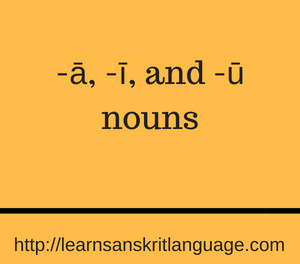In this article we shall deal with those words which are formed with -r suffix and through –tr suffix.
-tr suffix:
-tr suffix denotes doer or agent of some action. Look at the examples given below.
कृ → कर्तृ
kṛ → kartṛ
do, make → doer, maker
गम् → गन्तृ
gam → gantṛ
go → goer
हन् → हन्तृ
han → hantṛ
kill → killer
We need to attach the suffix to the verb root to attach the suffix. The rules for the same remain the same as FPP.
The root of the verb is strengthened to the medium level, the following words use tr at the end:
Han
Gam
Roots which end with ṛ
INFLECTION
The strong and weak suffixes are given in the table below:
| Endings | Strong stem | Weak stem | Special stem. |
| -tṛ | -tār | -tṛ | -tā |
It has to be understood that tr suffix comes from the term “tar”, which ends in consonant so the word will form a consonant stem, however, the “tr” suffix itself ends in a vowel and therefore vowel stems are also formed.
Look at the tables given below to understand further:
-ṛ (feminine and masculine):
| कार्तृ | Singular | Dual | Plural |
| Case 1 (Subject) | कार्ता kārtā | कार्तारौ kārtārau | कार्तारः kārtāraḥ |
| Case 2 (object) | कार्तारम् kārtāram | कार्तारौ kārtārau | कार्तॄन् kārtṝn |
| Case 3 (“with”) | कार्त्रा kārtrā | कार्तृभ्याम् kārtṛbhyām | कार्तृभिः kārtṛbhiḥ |
| Case 4 (“for”) | कार्त्रे kārtre | कार्तृभ्याम् kārtṛbhyām | कार्तृभ्यः kārtṛbhyaḥ |
| Case 5 (“from”) | कार्तुः kārtuḥ | कार्तृभ्याम् kārtṛbhyām | कार्तृभ्यः kārtṛbhyaḥ |
| Case 6 (“of”) | कार्तुः kārtuḥ | कार्त्रोः kārtroḥ | कर्तॄणम् kārtṝṇām |
| Case 7 (“in”) | कार्तरि kārtari | कार्त्रोः kārtroḥ | कार्तृषु kārtṛṣu |
| Case 8 (address) | कार्तः (र्) kārtaḥ (r) | कार्तारौ kārtārau | कार्तारः kārtāraḥ |
What is quite clear is that even though singular stems behave like consonant stems, the differences between case 5 and case 7 are quite noticeable. Plural forms follow consonant stems, but case 2 and case 6 follow the vowel stems.
FEMININE ENDINGS:
Suffix tri is used for feminine forms and the pattern followed is similar to the one followed in vāpī.
FAMILY RELATIONS:
Sanskrit has several words which are used to describe the family relationships. The most commonly used words end in –r. Look at the table given below to understand further.
| Sanskrit | English |
| पितृ | father |
| मातृ | mother |
| भ्रातृ | brother |
| स्वसृ | sister |
- An irregularity can be noticed in the nouns given above.
- As far as the feminine noun is concerned, mātṛ and svasṛ, is concerned, case two plural is -ṝs instead of -ṝn.
- The strong stem is -ar not –ār, however, the strong stem formed of svasṛ is svasār.
- The irregularity is caused by Brugmann’s law.



